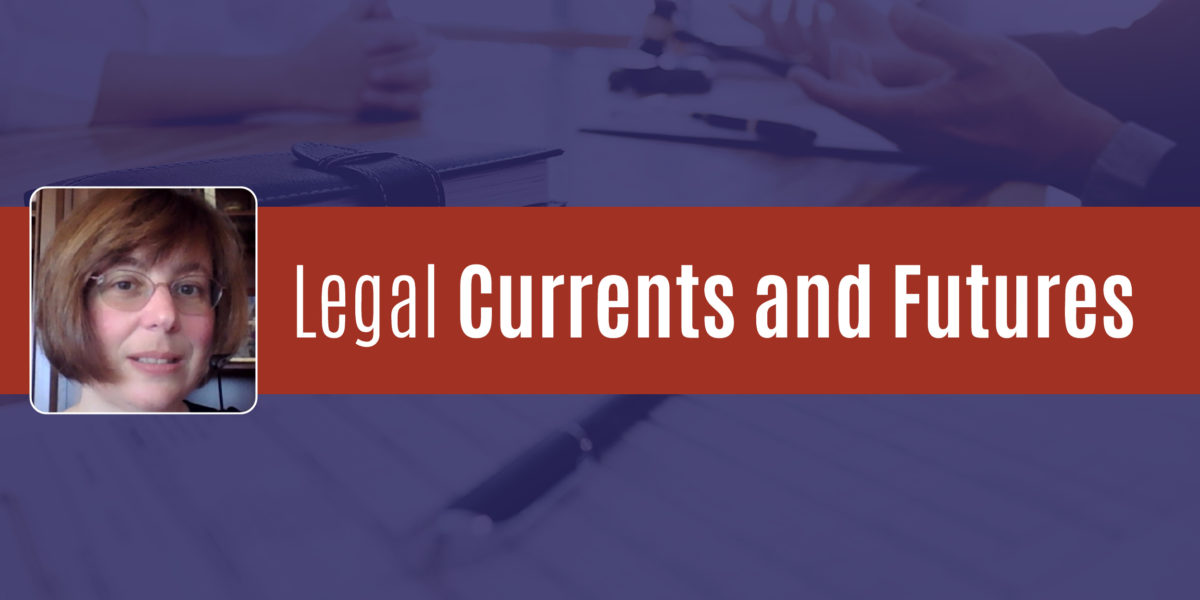Jeanne Eicks, J.D., associate dean of Graduate and Lifelong Learning Programs at The Colleges of Law, discusses the legal industry’s reaction to DoNotPay.
DoNotPay, a company that provides legal services applications to consumers, has been in the news lately. Despite receiving more than $28 million in investment since 2015, the company has come under fire from Seattle-based paralegal Kathryn Tewson, who claims the company failed to deliver legal services in the manner promised with legally sufficient and accurate results. Tewson based her fraud claim in part on her investigation of DoNotPay’s assertion that they use a “robot lawyer.” She claims that an artificial intelligence-powered robot would not take one to eight hours to respond to her requests when given a set of facts. As stated in her interview with Stephanie Wilkins at Law.com and Bob Ambrogi’s interview with her on LawNext, Tewson’s statements about DoNotPay appear valid.
Regardless of the validity of Tewson’s fraud claim, two statements made to Ambrogi during separate interviews with Josh Browder and Tewson highlight the need for regulation, standards, and oversight for legal applications. First, according to Tewson, she investigated the DoNotPay service with relative ease. “All I did was sign up for the site that anybody can sign up for and give it a spin,” she said. Second, when Ambrogi asked DoNotPay founder Browder whether the company had been sued civilly, Browder stated, “Lawyers have been trying to find someone [to sue DoNotPay], but in these cases, the stakes are so low that they haven’t managed to find anyone.”
Together these statements point to the avoidable failure of the legal profession to protect consumers. Funders, lawyers, state bar associations, and the media could have uncovered a sizeable problem that, by the investigator’s admission, took little effort to find. Unfortunately, since there are no regulations that set a standard for consumer-facing legal applications, nor a mechanism to review these legal products to ensure quality and function, no one reviewed DoNotPay’s services.
Some have argue that the unauthorized practice of law (UPL) covers these legal applications and that they should not exist. In his interview with Ambrogi, Browder argues that UPL only applies to persons, not robots. While Browder’s argument lacked strength and nuance, valid arguments may be made on both sides of the legal application UPL question. If we assume that UPL restricts legal applications, it remains a poor tool to keep consumers safe from unqualified or inaccurate legal advice. With technology that moves fast, and companies willing to break things, UPL investigations and prosecutions come too late for consumers.
Violations under UPL are acted on after legal applications have caused damage and failed to protect consumers. Regulations and standards would prevent these failures and eliminate costly UPL prosecutions that do not benefit the consumer. Regulatory standards governing consumer-facing legal service applications could require third-party quality testing on their efficacy and accuracy and usher in a better way to realize the potential for legal applications to bridge the access-to-justice gap.
Imagine a world where ChatGPT-powered chatbots vetted by a well-qualified panel of legal professionals can partially fill the access-to-justice gap. If the legal profession sets aside its protectionism and provides proper, fully transparent oversight, maybe robots could be welcomed as authorized practitioners of law.
________________
Jeanne Eicks, J.D., is the associate dean for Graduate and Lifelong Learning Programs at The Colleges of Law. With the goal of preparing students for careers that routinely intersect with the law—but do not require a law license—she has championed the development of the Master of Arts in Law program at The Colleges of Law.
About the Master of Arts in Law program
The M.A. in Law program prepares professionals for careers that routinely intersect with the law but do not require a J.D. or legal license. Students in the program can customize their education based on their professional interests, choosing from courses in business operations, entrepreneurship, emerging law, technology, and others.
Learn more about the M.A. in Law program by completing the form below.

